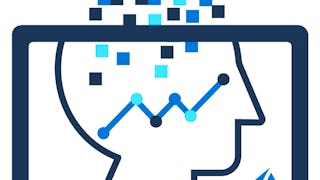This course is aimed at anyone interested in applying machine learning techniques to scientific problems. In this course, we'll learn about the complete machine learning pipeline, from reading in, cleaning, and transforming data to running basic and advanced machine learning algorithms. We'll start with data preprocessing techniques, such as PCA and LDA. Then, we'll dive into the fundamental AI algorithms: SVMs and K-means clustering. Along the way, we'll build our mathematical and programming toolbox to prepare ourselves to work with more complicated models. Finally, we'll explored advanced methods such as random forests and neural networks. Throughout the way, we'll be using medical and astronomical datasets. In the final project, we'll apply our skills to compare different machine learning models in Python.

Gain next-level skills with Coursera Plus for $199 (regularly $399). Save now.

Machine Learning Models in Science
This course is part of AI for Scientific Research Specialization



Instructors: Sabrina Moore
2,415 already enrolled
Included with
(12 reviews)
Recommended experience
What you'll learn
Implement and evaluate machine learning models (neural networks, random forests, etc.) on scientific data in Python
Skills you'll gain
- Data Transformation
- Data Cleansing
- Python Programming
- Machine Learning
- Dimensionality Reduction
- Random Forest Algorithm
- Supervised Learning
- Data Preprocessing
- Artificial Neural Networks
- Scikit Learn (Machine Learning Library)
- Applied Machine Learning
- Unsupervised Learning
- Classification Algorithms
- Predictive Modeling
Details to know

Add to your LinkedIn profile
5 assignments
See how employees at top companies are mastering in-demand skills

Build your subject-matter expertise
- Learn new concepts from industry experts
- Gain a foundational understanding of a subject or tool
- Develop job-relevant skills with hands-on projects
- Earn a shareable career certificate

There are 4 modules in this course
In this module, we'll tackle the steps taken before we can use AI algorithms. We'll start with an introduction to the most prominent data preprocessing techniques including filling in missing values and removing outliers. Then we'll dive into data transformations including PCA and LDA, two methods featured heavily for dimensionality reduction. Finally, we'll learn how to code the algorithms in Python to set up your data for use in the next module.
What's included
12 videos4 readings2 assignments1 discussion prompt
In this module, we'll dive into two of the most foundational machine learning algorithms: K-Means and support vector machines. We'll start by comparing the two branches of ML: supervised and unsupervised learning. Then, we'll go into the specific similarities and differences between K-Nearest neighbors for classification and K-Means clustering. Finally, we'll perform deep dives into K-Means and SVMs, learning the basic theory behind them and how to implement each in Python.
What's included
4 videos3 readings2 assignments1 programming assignment1 discussion prompt2 ungraded labs
In this module, we'll explore some advanced AI techniques. We'll start with tree-based algorithms, made popular because of the use of random forests for both classification and regression. Then, we'll build our way to neural networks, starting from experimentation on the different models. We'll spend some time in the Tensorflow playground getting familiar with the different mechanics behind neural networks. Finally, we'll code our own neural networks to make predictions on unseen data.
What's included
1 video4 readings1 assignment1 programming assignment1 discussion prompt2 ungraded labs
In this module, we'll go through a course project to predict diabetes from health data. We'll compare different regressors by implementing them and checking the error on a test set.
What's included
1 programming assignment1 ungraded lab
Earn a career certificate
Add this credential to your LinkedIn profile, resume, or CV. Share it on social media and in your performance review.
Offered by
Explore more from Machine Learning
 Status: Preview
Status: PreviewO.P. Jindal Global University
 Status: Free Trial
Status: Free Trial Status: Free Trial
Status: Free Trial Status: Free Trial
Status: Free Trial
Why people choose Coursera for their career




Learner reviews
12 reviews
- 5 stars
50%
- 4 stars
8.33%
- 3 stars
33.33%
- 2 stars
8.33%
- 1 star
0%
Showing 3 of 12
Reviewed on Jul 7, 2022
I would have had more stars, but a couple of the programming assignments had different values for random used for the answer and not what was listed in the question.

Open new doors with Coursera Plus
Unlimited access to 10,000+ world-class courses, hands-on projects, and job-ready certificate programs - all included in your subscription
Advance your career with an online degree
Earn a degree from world-class universities - 100% online
Join over 3,400 global companies that choose Coursera for Business
Upskill your employees to excel in the digital economy
Frequently asked questions
To access the course materials, assignments and to earn a Certificate, you will need to purchase the Certificate experience when you enroll in a course. You can try a Free Trial instead, or apply for Financial Aid. The course may offer 'Full Course, No Certificate' instead. This option lets you see all course materials, submit required assessments, and get a final grade. This also means that you will not be able to purchase a Certificate experience.
When you enroll in the course, you get access to all of the courses in the Specialization, and you earn a certificate when you complete the work. Your electronic Certificate will be added to your Accomplishments page - from there, you can print your Certificate or add it to your LinkedIn profile.
Yes. In select learning programs, you can apply for financial aid or a scholarship if you can’t afford the enrollment fee. If fin aid or scholarship is available for your learning program selection, you’ll find a link to apply on the description page.
More questions
Financial aid available,

